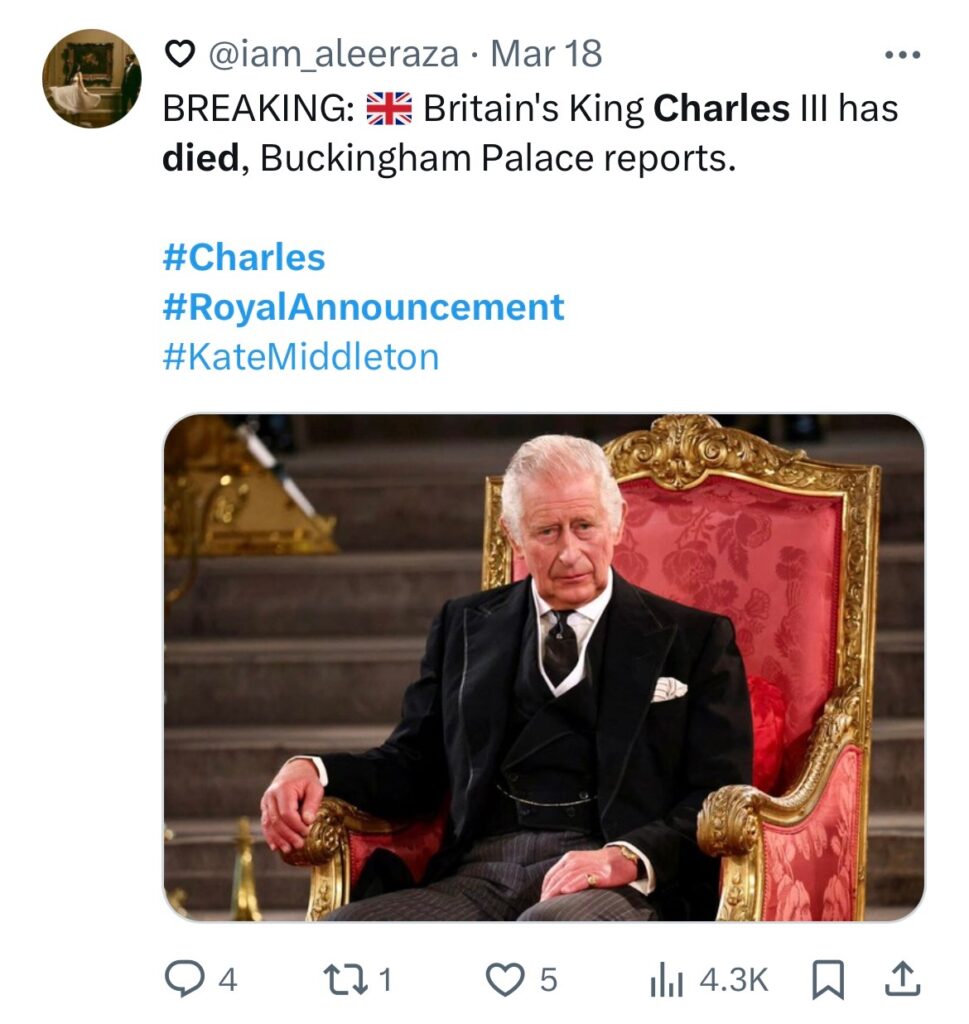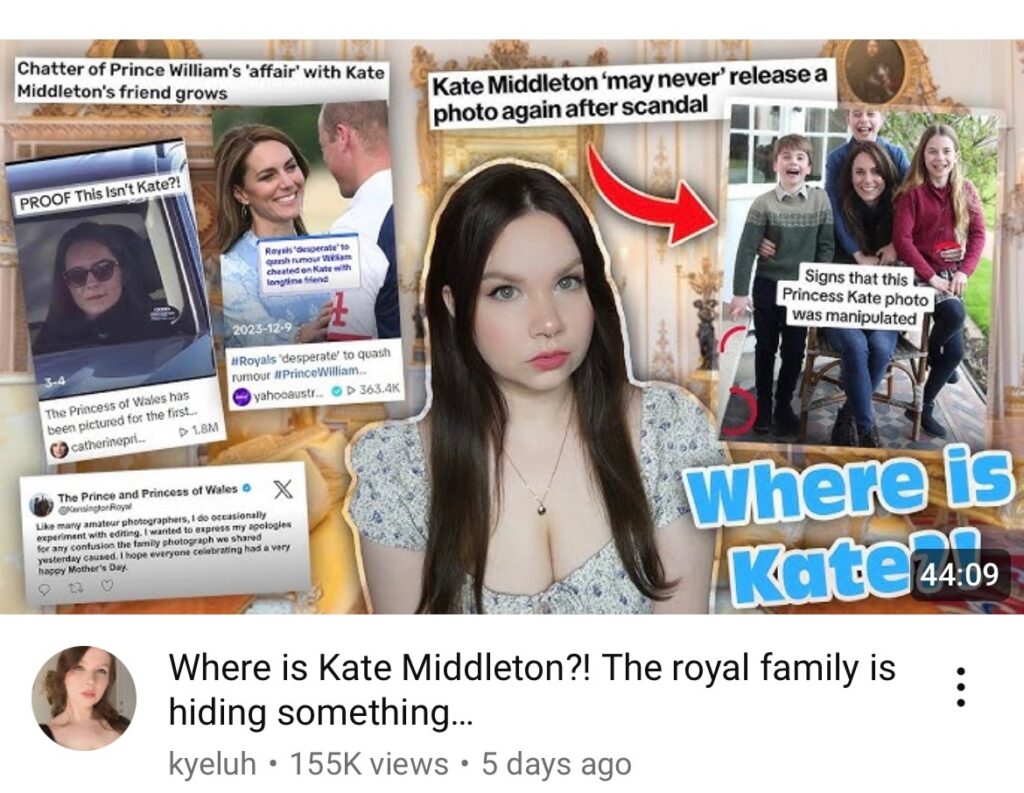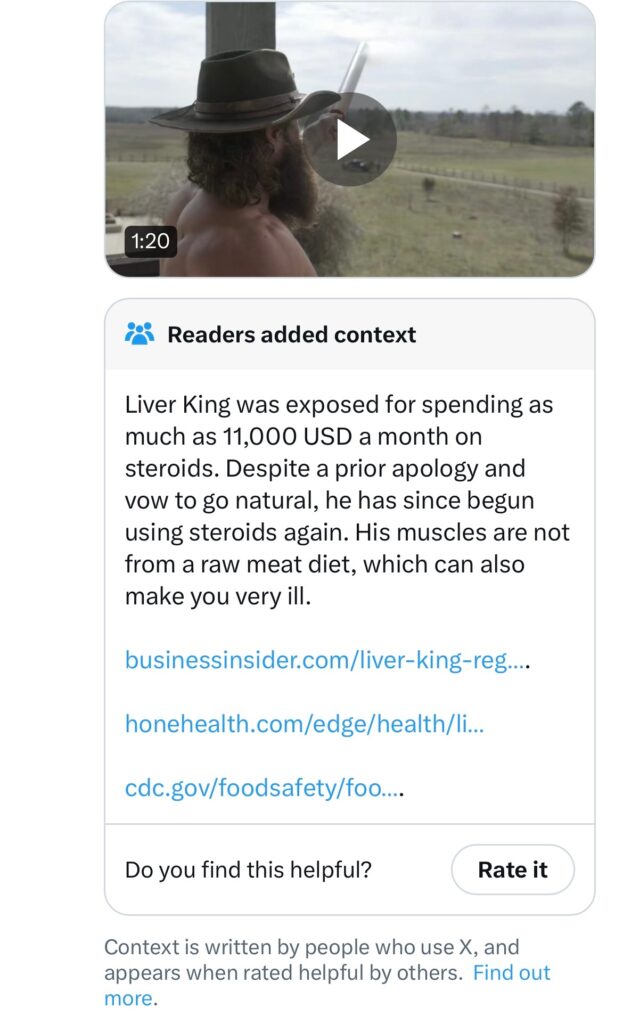My 24-Hour Media Diet:
Monday March 18th, 2024
8:30 AM- I turn off the alarm on my phone. Still groggy from sleep, I check my ASU email and my personal AOL email. It’s my daily habit to check this every morning in case there’s anything that needs my immediate attention.
8:45 AM- I go downstairs and make some oatmeal for breakfast. Sitting down to eat, I turn the TV on and put it on one of my local news channels, channel 3TV. As I’m eating, I log onto Twitter/X on my phone and scroll what’s on my feed.
9:30 AM- After eating my breakfast and scrolling my feed for a while, I look at the trending topics. I like to do this to get an idea of anything important going on and it makes me feel connected with what’s going on in the world.
10:00 AM- One of the topics that’s caught my eye is #RoyalAnnouncement. Full disclosure, reading about the royals is a guilty pleasure of mine. I see tweets about how there will soon be a royal announcement made because apparently, King Charles died the previous day (Sunday, March 17th).


I’m instantly suspicious about the accuracy of this. If King Charles had died, it would have been major news everywhere and Twitter is the only place I’m hearing of this.
11:00 AM- I go on my laptop and peruse some of the headlines on the Washington Post’s home page. I clicked on a headline explaining that 81 million people in the U.S. will suffer from allergies this spring. As an allergy sufferer, I’m interested in this topic. The article cites a study showing that the warmer climate is contributing to a longer pollen season and because of that, we become more sensitized to allergens. Climate change is having a direct impact on our seasonal allergies.
12:00 PM- My mom texts me a link to an article from KTAR (an Arizona news radio station) about the murder suspects in the Preston Lord case. My family has been following this story as it happened in my local community. Last year, a gang of teenage boys and young men beat a 16-year-old boy to death and the suspects have recently been arrested.
12:45 PM- I make some lunch and sit down to eat. As I’m eating, I log onto YouTube on my laptop. I watched a video from Kyeluh about the Kate Middleton conspiracy theories. Kyeluh (the YouTuber) gives a rundown of the conspiracy theories that have been going around on social media.
There aren’t links in the description, but she tells which news sites she got some quotes and headlines from. She also includes a video from the BBC. Even though she says where she got some of the information, she is ultimately giving her own opinion on the matter and what she thinks is going on and finds suspicious. I don’t consider this news but rather commentary/opinion.

2:00 PM- My mom and I take a walk to our nearest Starbucks. After we get our drinks and sit down, I scroll through my Twitter feed again.
4:00 PM- After walking home, I get started on my homework and reading for my MCO 427 class.
6:30 PM- While sitting down to eat dinner with my family, we watch several episodes of The Office on Peacock until bedtime. My phone is almost dead, so I put it on the charger. I take this time to give myself a break from being on my phone.
10:00 PM- Back in my room relaxing for the night, I scroll some more on Twitter. When I click a tweet, I almost always get an ad for Liver King. This is an influencer who has claimed that he lives on raw meat and that is why he has a muscular build. But there is never any data he provides to back up these claims. The community notes below the tweet show that this has been flagged by others as misinformation because he uses steroids not just raw meat as he claims. There are also links provided that prove his use of steroids and that eating raw meat is unhealthy.


11:30 PM- I get ready for bed and that’s my end of the day.
Flagging & Fact-Checking: I immediately found the tweets announcing King Charles’ death to be suspicious. The tweets were not coming from journalists or news outlets, just random users. When I was perusing the headlines from the Washington Post, I noticed that there was no mention of King Charles’ supposed death. This would be major world news and there would be something on the homepage if it had happened. I also went to the BBC’s website as this would be one of the first places where this news would break and there was no mention of it.
I would also flag the advertisements I get on Twitter for Liver King. A diet of raw meat sounds unhealthy, and Liver King doesn’t provide any data or evidence of it being effective. The community notes did my fact-checking for me. It provided me with the context that Liver King uses steroids to achieve his muscular build. Links were provided that proved this and one included a CDC article describing how eating raw meat is unhealthy.
Community notes are a great addition to Twitter because they can be used to stop the spread of misinformation and show context that’s missing in the tweet. But there are lots of tweets that slip through the cracks because for a tweet to receive community notes, users must rate the notes as helpful for them to appear. So, I am skeptical of any information I come across on Twitter.
Analysis: My media diet has shown me that I only use Twitter and YouTube when I’m bored and just want to pass the time. I am more inclined to fact-check content on Twitter because anyone can post anything. Whereas, when I’m reading an article from the Washington Post or a local news outlet, I trust those a lot more. For example, the article about allergies provided studies that show the evidence of the article’s claims.
Even though the Washington Post and local news outlets can make mistakes and get things wrong, I trust them because it is traditional journalism. There are journalistic ethics and procedures that went into these articles rather than someone just tweeting. I’m also more inclined to fact-check information on YouTube because a lot of it is commentary/opinion and again, anyone can post anything. It is because of this that I will continue to fact-check the information I see on social media.
The amount of questionable content I saw was what I expected because I have come across a lot of misinformation before on social media. I’m more inclined to fact-check social media because users don’t have to adhere to journalistic ethics and procedures. As we learned in one of the module 2 lecture videos, people share misinformation for reasons such as they believe it’s interesting, it’s interesting-if-true, for fun, or because they believe they are being helpful.